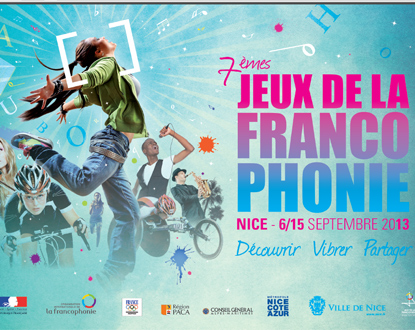A week ago, the 7th Francophonie Games began in Nice, lasting ten days of cultural and sports competitions. The Games experienced ups and downs but were supported by the entire population and local government employees who were much more motivated than the national media, which, aside from the opening ceremony, completely ignored the event.
President of the Francophonie Games Organizing Committee, Christian Estrosi, did not miss his targets during the thank-you ceremony for the Nice and Azorean volunteers who contributed their help and support to the event’s organization: “I must thank and congratulate everyone who helped build these Games, which were overlooked by the national media and particularly by France Télévision, which covered no competition despite numerous proposals from me.”
It is clear that only sensational news gained some journalists’ and mainly local media’s attention, with mishaps extensively highlighted and thoroughly commented on, the disappearances of some participants (as if it were the first time in an official competition) or the systematic criticism of the transportation and other services of the event. Yet, at the heart of it all, it was the 1,400 volunteers who ensured that the small imperfections inherent in this type of organization did not turn into real disasters, even if sometimes it came close, as the saying goes!
Present from 8 AM in an Acropolis Palace transformed into the nerve center of the games, it was often around 10 PM that the last volunteers left the premises after a day where the lunch break was frequently omitted. And what about the bus or official car drivers, on the job from 7 AM and making more or less long trips to the competition sites until late at night. Not to forget, the delegation leaders, accommodation or catering center directors, sports competition referees and officials, cultural competition juries and heads… The list is indeed long, comprised mostly of volunteers who, for the most part, were experiencing their first large-scale event from the inside and in control of a sector.
From Friday, September 6, the official opening of the Games, it’s equivalent to a large company that started operating for about ten days that undoubtedly left a lasting impression on each and every one of them: “It was a fantastic experience, and despite a few imperfections, we always met each request made. It was physically very challenging, and we’ll all remember it, I think!” Léa, a volunteer at the Acropolis accreditation center, was at the forefront throughout the Games.
On the playing fields and in the performance halls, the startup also experienced a few hiccups, but after a day of adjustments, everything was sorted out, especially thanks to the unwavering support of certain directions from the city of Nice and the Nice Côte d’Azur Metropolis. Thus, the Sports Department was the cornerstone of all sports competitions, delivering an almost perfect performance despite the inevitable organizational challenges of multi-sport competitions (football, basketball, athletics, wrestling, judo, table tennis, cycling, African wrestling, etc.).
So yes, the organization could have sometimes done better, but the only thing that really matters, a few days after the closing, is the commitment of the people of Nice and the Azorean volunteers who gave it their all to ensure the games were a success.
And they were well executed, thanks to them!


